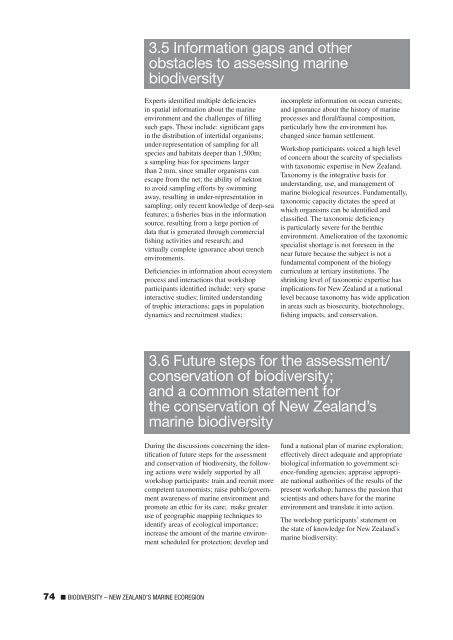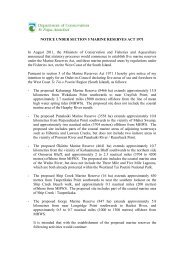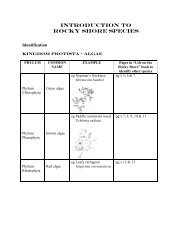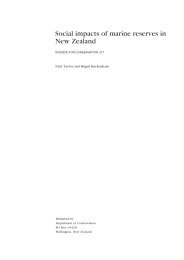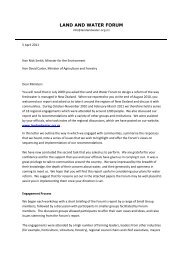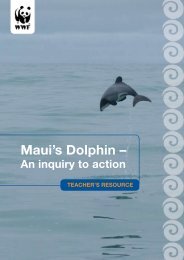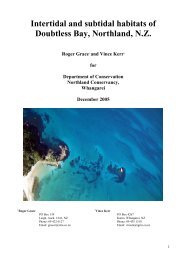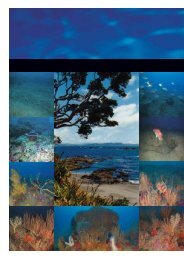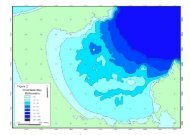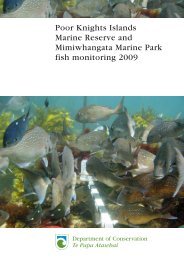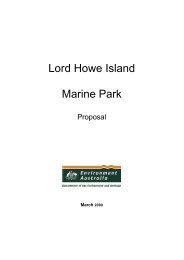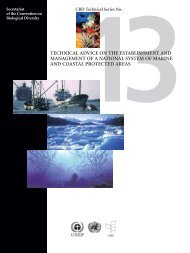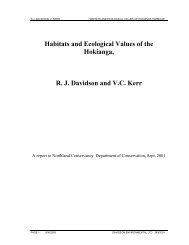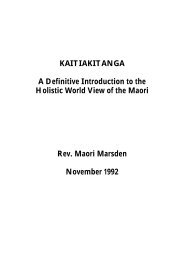WWF Shining a spotlight on the biodiversity of ... - MarineNZ.org.nz
WWF Shining a spotlight on the biodiversity of ... - MarineNZ.org.nz
WWF Shining a spotlight on the biodiversity of ... - MarineNZ.org.nz
Create successful ePaper yourself
Turn your PDF publications into a flip-book with our unique Google optimized e-Paper software.
3.5 Informati<strong>on</strong> gaps and o<strong>the</strong>r<br />
obstacles to assessing marine<br />
<strong>biodiversity</strong><br />
Experts identified multiple deficiencies<br />
in spatial informati<strong>on</strong> about <strong>the</strong> marine<br />
envir<strong>on</strong>ment and <strong>the</strong> challenges <strong>of</strong> filling<br />
such gaps. These include: significant gaps<br />
in <strong>the</strong> distributi<strong>on</strong> <strong>of</strong> intertidal <strong>org</strong>anisms;<br />
under-representati<strong>on</strong> <strong>of</strong> sampling for all<br />
species and habitats deeper than 1,500m;<br />
a sampling bias for specimens larger<br />
than 2 mm, since smaller <strong>org</strong>anisms can<br />
escape from <strong>the</strong> net; <strong>the</strong> ability <strong>of</strong> nekt<strong>on</strong><br />
to avoid sampling efforts by swimming<br />
away, resulting in under-representati<strong>on</strong> in<br />
sampling; <strong>on</strong>ly recent knowledge <strong>of</strong> deep-sea<br />
features; a fisheries bias in <strong>the</strong> informati<strong>on</strong><br />
source, resulting from a large porti<strong>on</strong> <strong>of</strong><br />
data that is generated through commercial<br />
fishing activities and research; and<br />
virtually complete ignorance about trench<br />
envir<strong>on</strong>ments.<br />
Deficiencies in informati<strong>on</strong> about ecosystem<br />
process and interacti<strong>on</strong>s that workshop<br />
participants identified include: very sparse<br />
interactive studies; limited understanding<br />
<strong>of</strong> trophic interacti<strong>on</strong>s; gaps in populati<strong>on</strong><br />
dynamics and recruitment studies;<br />
incomplete informati<strong>on</strong> <strong>on</strong> ocean currents;<br />
and ignorance about <strong>the</strong> history <strong>of</strong> marine<br />
processes and floral/faunal compositi<strong>on</strong>,<br />
particularly how <strong>the</strong> envir<strong>on</strong>ment has<br />
changed since human settlement.<br />
Workshop participants voiced a high level<br />
<strong>of</strong> c<strong>on</strong>cern about <strong>the</strong> scarcity <strong>of</strong> specialists<br />
with tax<strong>on</strong>omic expertise in New Zealand.<br />
Tax<strong>on</strong>omy is <strong>the</strong> integrative basis for<br />
understanding, use, and management <strong>of</strong><br />
marine biological resources. Fundamentally,<br />
tax<strong>on</strong>omic capacity dictates <strong>the</strong> speed at<br />
which <strong>org</strong>anisms can be identified and<br />
classified. The tax<strong>on</strong>omic deficiency<br />
is particularly severe for <strong>the</strong> benthic<br />
envir<strong>on</strong>ment. Ameliorati<strong>on</strong> <strong>of</strong> <strong>the</strong> tax<strong>on</strong>omic<br />
specialist shortage is not foreseen in <strong>the</strong><br />
near future because <strong>the</strong> subject is not a<br />
fundamental comp<strong>on</strong>ent <strong>of</strong> <strong>the</strong> biology<br />
curriculum at tertiary instituti<strong>on</strong>s. The<br />
shrinking level <strong>of</strong> tax<strong>on</strong>omic expertise has<br />
implicati<strong>on</strong>s for New Zealand at a nati<strong>on</strong>al<br />
level because tax<strong>on</strong>omy has wide applicati<strong>on</strong><br />
in areas such as biosecurity, biotechnology,<br />
fishing impacts, and c<strong>on</strong>servati<strong>on</strong>.<br />
3.6 Future steps for <strong>the</strong> assessment/<br />
c<strong>on</strong>servati<strong>on</strong> <strong>of</strong> <strong>biodiversity</strong>;<br />
and a comm<strong>on</strong> statement for<br />
<strong>the</strong> c<strong>on</strong>servati<strong>on</strong> <strong>of</strong> New Zealand’s<br />
marine <strong>biodiversity</strong><br />
During <strong>the</strong> discussi<strong>on</strong>s c<strong>on</strong>cerning <strong>the</strong> identificati<strong>on</strong><br />
<strong>of</strong> future steps for <strong>the</strong> assessment<br />
and c<strong>on</strong>servati<strong>on</strong> <strong>of</strong> <strong>biodiversity</strong>, <strong>the</strong> following<br />
acti<strong>on</strong>s were widely supported by all<br />
workshop participants: train and recruit more<br />
competent tax<strong>on</strong>omists; raise public/government<br />
awareness <strong>of</strong> marine envir<strong>on</strong>ment and<br />
promote an ethic for its care; make greater<br />
use <strong>of</strong> geographic mapping techniques to<br />
identify areas <strong>of</strong> ecological importance;<br />
increase <strong>the</strong> amount <strong>of</strong> <strong>the</strong> marine envir<strong>on</strong>ment<br />
scheduled for protecti<strong>on</strong>; develop and<br />
fund a nati<strong>on</strong>al plan <strong>of</strong> marine explorati<strong>on</strong>;<br />
effectively direct adequate and appropriate<br />
biological informati<strong>on</strong> to government science-funding<br />
agencies; appraise appropriate<br />
nati<strong>on</strong>al authorities <strong>of</strong> <strong>the</strong> results <strong>of</strong> <strong>the</strong><br />
present workshop; harness <strong>the</strong> passi<strong>on</strong> that<br />
scientists and o<strong>the</strong>rs have for <strong>the</strong> marine<br />
envir<strong>on</strong>ment and translate it into acti<strong>on</strong>.<br />
The workshop participants’ statement <strong>on</strong><br />
<strong>the</strong> state <strong>of</strong> knowledge for New Zealand’s<br />
marine <strong>biodiversity</strong>:<br />
74 ■ BIODIVERSITY – NEW ZEALAND’S MARINE ECOREGION


